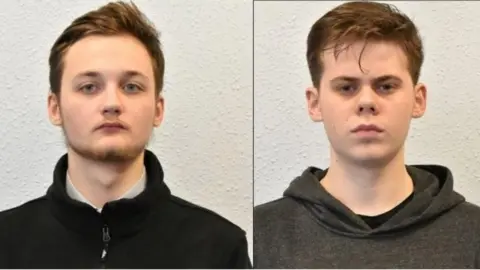Extremist neo-Nazi group to be banned under terror laws
 EPA
EPAJoining the far-right group Sonnenkrieg Divison is set to become illegal, under a proscription order to be put to MPs.
The order would also label two other groups aliases of another proscribed organisation - the Kurdistan Workers' Party (PKK).
Laws due to come into effect on Tuesday will also recognise System Resistance Network as an alias of the already banned neo-Nazi group National Action.
Membership of the groups could result in a 10 year prison sentence.
Home Secretary Priti Patel said: "Recent attacks here and in Germany have highlighted the threat we continue to face from violent extremism.
"By proscribing these groups we are making it much harder for them to spread their hateful rhetoric."
In June 2019, two members of the Sonnenkrieg Division - Michal Szewczuk and Oskar Dunn-Koczorowski - were jailed after encouraging an attack on Prince Harry for marrying a woman of mixed race.

Analysis by the BBC's Daniel De Simone
Sonnenkrieg Division emerged from a split in the System Resistance Network, which itself will be proscribed on Tuesday as an alias of National Action.
Both the groups were small when at their height and have been severely disrupted since - to the extent that some may question whether this move is now necessary.
However, their ideologies and propaganda were openly terroristic, with Sonnenkrieg - formed as a European version of a militant American organisation - possibly the most extreme neo-Nazi group ever seen in the UK.
Banning them will give the authorities greater power to investigate individual members and tackle any future iteration of the organisations that are yet to appear.

The decision to ban membership of the organisation was taken following a meeting of the Proscription Review Group.
The proscription order - which is subject to parliamentary approval - also proposes treating the groups - Teyre Azadiye Kurdistan (TAK) and Hezen Parastina Gel (HPG) - as aliases for the PKK.
According to a House of Commons Library report, the PKK "does not have any overt representation in the UK but operates covertly and has some support among the Kurdish community".
